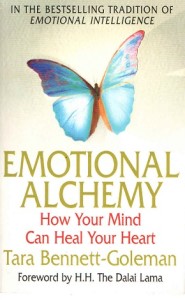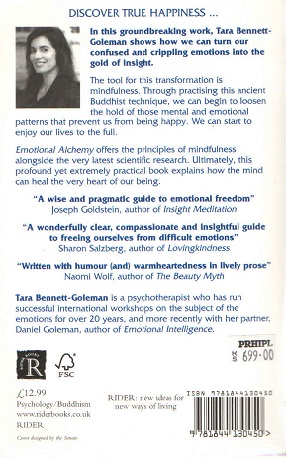Emotional Alchemy: How Your Mind Can Heal Your Heart
By Tara Bennett-Goleman
Foreword by the Dalai Lama
We all desire happiness and do not want suffering. Because the very purpose of life is to be happy, it is important to discover what will bring about the greatest degree of happiness. Whether our experience is pleasant or miserable, it is either mental or physical. Generally, it is the mind that exerts the greatest influence on most of
us. Therefore, it is extremely worthwhile to try to bring about mental peace.
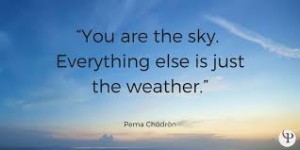
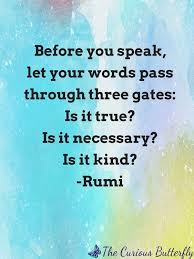
Although material progress is important for human advancement, if we pay too much attention to external things and give too little importance to inner development, the imbalance will lead to problems. Inner peace is the key; if we have inner peace we will be able to deal with situations with calmness and reason. Without inner peace, no matter how comfortable our life is materially, we may still be worried, disturbed, or unhappy because of the circumstances.
When we have inner peace, we can be at peace with those around us. When our community is in a state of peace, it can share that peace with neighboring communities and so on. When we feel love and kindness toward others, it not only makes others feel loved and cared for but also helps us to develop inner happiness and peace.
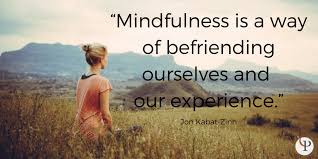
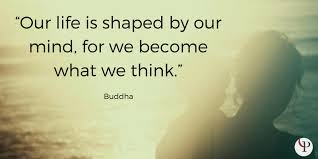
As a Buddhist I have learned that what principally upsets our inner peace is what we call disturbing emotions. All those thoughts, emotions, and mental events that reflect a negative or uncompassionate state of mind inevitably undermine our experience of inner peace. All such negative thoughts and emotions as hatred, anger, pride, lust, greed, envy, and so on have the effect of disturbing our inner equilibrium. They also have a taxing effect on our physical health, In the Tibetan medical system, mental and emotional disturbances have long been considered causes of many constitutional diseases, including cancer, Scientists and health professionals in the West increasingly share this point of view, too. Disturbing emotions are the very source of unethical conduct. They are also the basis of anxiety, depression, confusion, and stress, which are such a feature of our lives today. And yet, because we so often fail to recognize their destructive potential, we do not see the need to challenge them.
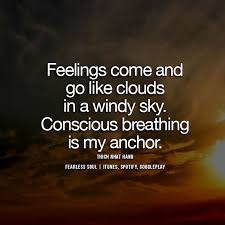
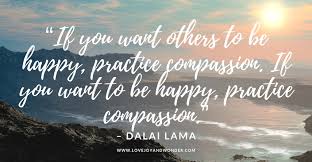 In this book, Emotional Alchemy, Tara Bennett-Goleman offers a method to calm the mind and free it from disturbing emotions: a practical application of mindfulness in the realm of emotion. Based on personal experience she has drawn together insights and methods from cognitive and brain science, from psychotherapy, and from Buddhist psychology and mindfulness practice. She shows people how they can use mindfulness to loosen the hold of mental and emotional habits that prevent them from being happy.
In this book, Emotional Alchemy, Tara Bennett-Goleman offers a method to calm the mind and free it from disturbing emotions: a practical application of mindfulness in the realm of emotion. Based on personal experience she has drawn together insights and methods from cognitive and brain science, from psychotherapy, and from Buddhist psychology and mindfulness practice. She shows people how they can use mindfulness to loosen the hold of mental and emotional habits that prevent them from being happy.
A great Tibetan teacher of mind training once remarked that one of the mind’s most marvelous qualities is that it can be transformed. I offer my prayers that readers of this book who put the advice it contains into practice may indeed be able to transform their minds, overcome their disturbing emotions, and achieve a sense of inner peace. Not only will they then be hap- pier in themselves, but they will undoubtedly contribute to greater peace and happiness in the world at large.
An Inner Alchemy
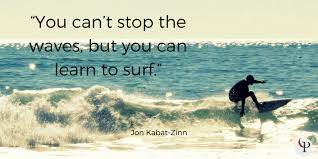
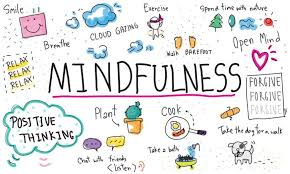 From the window of my London hotel room Big Ben displays itself, a prominent, elegant presence amid the vista of river, billowing clouds, and spreading jumble of skyline. Big Ben has a grandeur as a piece of architecture, but I find my eye drawn more to the broad, open expanse of sky and river. The panorama above and below Big Ben’s rounded bluntness includes a resplendence of steeples and bridges that occupy the central view from my window. I notice how my mind, at first glance, takes in the spaciousness of the cloud-filled sky and the soothing expanse of the river below like a regal oil painting by some turn-of-the-century landscape artist, or like a postcard-perfect snapshot. But as I gaze more carefully, with a sustained attention, 1 notice that the still snapshot-like rendering of this scene dissolves into a whirl of constant motion, a continuing series of tiny movements that add up to a vastly altered picture. There are tiny successive changes in the shape of clouds as they glide across the sky, sometimes opening up patches of sky through which rays of sunlight spill along the landscape, illuminating shadows into patches of light. There’s the translucent shine of buildings and roads and bright red buses as they momentarily bathe in the glow. The scene before me shimmers with kinetic energy. And so it is with our inner landscapes. This shift in my perception mirrors how the mind works: the tendency to assume it has got the whole picture on first glance, to rush on without a closer look, and the sometimes startling fact that if one continues to look more
From the window of my London hotel room Big Ben displays itself, a prominent, elegant presence amid the vista of river, billowing clouds, and spreading jumble of skyline. Big Ben has a grandeur as a piece of architecture, but I find my eye drawn more to the broad, open expanse of sky and river. The panorama above and below Big Ben’s rounded bluntness includes a resplendence of steeples and bridges that occupy the central view from my window. I notice how my mind, at first glance, takes in the spaciousness of the cloud-filled sky and the soothing expanse of the river below like a regal oil painting by some turn-of-the-century landscape artist, or like a postcard-perfect snapshot. But as I gaze more carefully, with a sustained attention, 1 notice that the still snapshot-like rendering of this scene dissolves into a whirl of constant motion, a continuing series of tiny movements that add up to a vastly altered picture. There are tiny successive changes in the shape of clouds as they glide across the sky, sometimes opening up patches of sky through which rays of sunlight spill along the landscape, illuminating shadows into patches of light. There’s the translucent shine of buildings and roads and bright red buses as they momentarily bathe in the glow. The scene before me shimmers with kinetic energy. And so it is with our inner landscapes. This shift in my perception mirrors how the mind works: the tendency to assume it has got the whole picture on first glance, to rush on without a closer look, and the sometimes startling fact that if one continues to look more 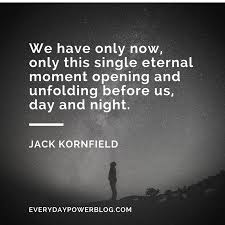
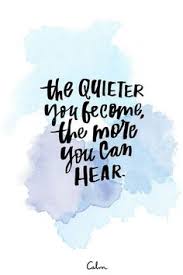 carefully, there is always more to be discovered beyond those initial assumptions. Too often we take our first impressions, the conclusions from a first hasty glance, as the lasting truth of the moment. But if we keep looking and noticing, we become aware of greater detail and nuance, of changes and second thoughts, and much more. We can see things more as they actually are, rather than as they appear to be. We can bring a more precise understanding to the moment.
carefully, there is always more to be discovered beyond those initial assumptions. Too often we take our first impressions, the conclusions from a first hasty glance, as the lasting truth of the moment. But if we keep looking and noticing, we become aware of greater detail and nuance, of changes and second thoughts, and much more. We can see things more as they actually are, rather than as they appear to be. We can bring a more precise understanding to the moment.
If we sustain our gaze within, sometimes our probe may detect pain behind the masks we wear. But if we continue to look, we can see how the patterns of pain hold that very mask in place, and as we investigate further we see even these patterns shift and rearrange themselves. We see how our reactions to our emotions can keep us at a distance from ourselves. And if we sustain our focus, allowing ourselves to open more honestly, our awareness penetrates further, unraveling and dissolving, peeling away the layers as we look still further. We begin to connect with more genuine parts of ourselves, at first in glimpses. Then, as we sustain our gaze, we connect with a source that breathes awareness into every layer of our being.
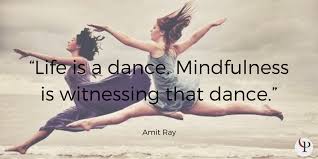
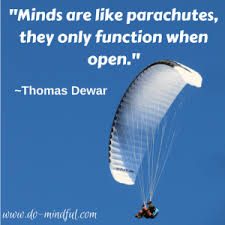
This book is about seeing ourselves as we genuinely are, not as we seem on first glance as viewed through the filters of our habitual assumptions and emotional patterns, We will explore how through the practice of mindfulness—a method for training the mind to expand the scope of awareness while refining its precision—we can reach beyond the limiting ways we see ourselves. We will see how to disengage from the emotional habits that undermine our lives and our relationships. We will discover how a precise mindfulness can investigate these emotional habits, bringing an insightful clarity to distinguish between the seeming and the actual.
Tara Bennett-Goleman, M.A., is a teacher, author, and psychotherapist.
Tara Bennett-Goleman combines principles and practices from horse whispering with mindfulness and Buddhist psychology, the neuroscience of habit change, and cognitive therapy. This gentle path of awakening offers a new lens on re-patterning our emotional habits and everyday ways of being.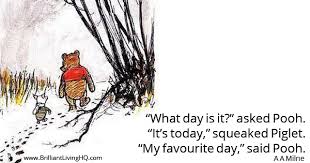
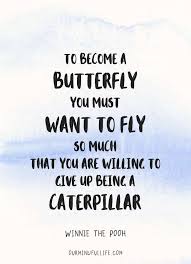
Peace starts with our own mind and radiates out to our relationships, communities, and our global family.
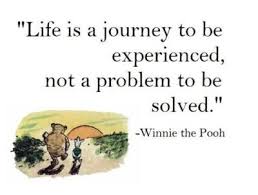
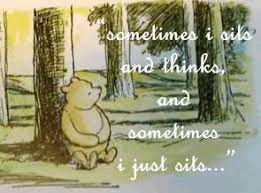
Tara continues to offer workshops internationally based on Emotional Alchemy and Mind Whispering, and has given training seminars in this educational/therapeutic approach to mental health professionals for the New England Educational Institute’s Cape Cod Seminars, Cambridge Hospital at Harvard Medical School, and the Santa Barbara Family Therapy Institute.
She also focuses on multi-cultural and inter-disciplinary fusions, integrating awareness training with the arts, social action, and psychology. Tara sees inter-cultural fusion as a way to inspire appreciation and respect for ethnic diversity through an expression of the unique flavor of different cultural traditions. Her interest in fusion – in the arts, psychology, meditation, and social action continues to the present.
Emotional Alchemy: How The Mind Can Heal The Heart
How Mindfulness Transforms Us | Jo Pang | TEDxGateway
Self-Transformation Through Mindfulness | Dr. David Vago | TEDxNashville
The Power of Mindfulness: What You Practice Grows Stronger | Shauna Shapiro | TEDxWashingtonSquare
